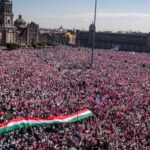US and UK ambassadors to Russia lay Navalny tributes
The US and UK ambassadors to Moscow have paid their respects to Alexei Navalny, the Russian opposition leader who passed away in prison on Friday, by laying flowers in his honor.
Ambassador Lynne Tracy of the United States and Britain’s Nigel Casey were captured in photographs as they visited a memorial in Moscow to commemorate Navalny.
Navalny’s supporters suspect that he was assassinated at the behest of President Vladimir Putin, while prison authorities attribute his death to “sudden death syndrome.”
Approximately 400 Russians have been arrested at gatherings held in support of the activist.
Images depicted a growing mound of flowers left for Navalny at the Solovetsky Stone, a monument symbolizing political repression that has emerged as a significant location for tributes to the 47-year-old.
“Today at the Solovetsky Stone, we grieve the loss of Alexei Navalny and other victims of political repression in Russia,” stated the US embassy in Moscow on social media.
“We offer our deepest condolences to Alexei Navalny’s family, colleagues, and supporters. His resilience serves as an inspirational model. We pay tribute to his memory,” the embassy’s message continued.
The UK embassy in Moscow, through its account on X, formerly known as Twitter, shared a photo of the British ambassador visiting the memorial on Saturday. In an earlier tweet, it called for a thorough and transparent investigation into Navalny’s death.
The embassy reported that the Foreign Office had summoned a representative of the Russian embassy, stressing that “we unequivocally hold the Russian authorities accountable for Alexei’s death.”
According to Downing Street, Prime Minister Rishi Sunak conversed with European Commission President Ursula von der Leyen on Sunday, during which they “expressed their indignation” at Navalny’s passing and emphasized “the paramount importance of ensuring accountability for those responsible within the Russian system.”
Navalny’s wife, Yulia, posted an Instagram on Sunday a photo of herself with her husband and the caption “I love you”.
She had earlier called for the Russian president and his allies to be held accountable for her husband’s death.
Navalny’s wife, Yulia, posted an Instagram on Sunday a photo of herself with her husband and the caption “I love you”.
She had earlier called for the Russian president and his allies to be held accountable for her husband’s death.
The EU’s foreign policy chief, Josep Borrell, confirmed on X that he would welcome Ms Navalnaya at the bloc’s Foreign Affairs Council on Monday.
He said that EU ministers would honour Navalny’s memory and “send a strong message of support to freedom fighters in Russia”.
As tributes pour in for the Kremlin critic, questions remain over the whereabouts of Navalny’s body, with allies accusing the Russian authorities of hiding his body.
Russian prison authorities said on Friday that the opposition activist had become unwell following a walk and had lost consciousness at the remote IK-3 prison in the Arctic Circle – also known as the Siberian “Polar Wolf” penal colony.
Navalny allies said the politician’s mother, Lyudmila Navalnaya, was told his body would only be handed over once a post-mortem examination had been completed, and that the cause of death was said to be “sudden death syndrome” – a generic, vague term for a condition which could cover a cardiac arrest with no apparent cause.
Navalny’s allies said that Ms Navalnaya was told his body had been taken to the town of Salekhard, near the prison complex, but when she arrived the morgue was closed.
Prison officials reportedly told her an initial post-mortem examination was inconclusive and a second would have to be carried out.
The Russian president has not publicly commented on Navalny’s death, but in the immediate aftermath, the Kremlin said it was aware and the president had been informed.
Russia’s Foreign Ministry said it rejected “biased and unrealistic” assessments over his cause of death made during a meeting with British officials on Saturday.



